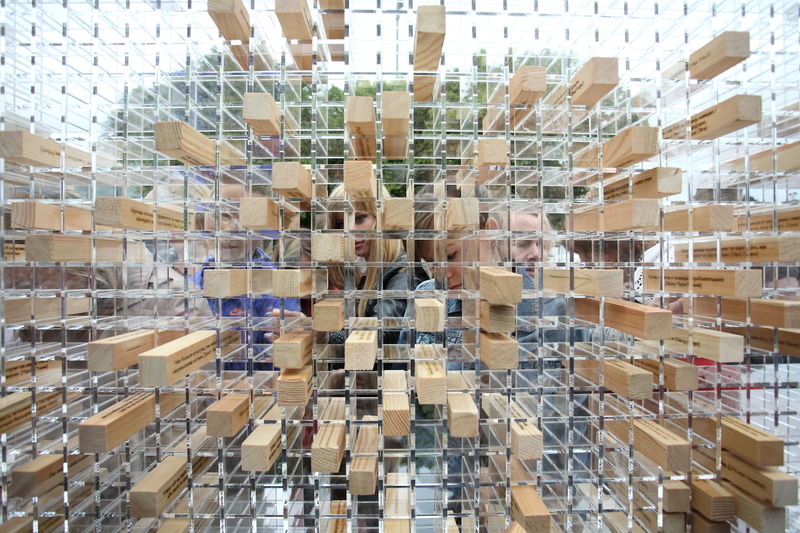Thessaloniki gets ready for its metro launch in November
The underground rapid transit lines have been under construction for almost two decades due to various project delays
 TheMayor.EU logo
TheMayor.EU logo They can be seen in 10 countries
Disappearing walls with hidden messages have taken over public spaces in 17 EU cities. The interactive installations are placed by Goethe-Institut on the occasion of the German EU Council Presidency. Everyone who sees one of them can take home a part of the wall and thus bringing with them a piece of European culture and history.
On around 6,000 wooden blocks, the disappearing walls carry quotes from famous representatives of European culture and put on display the diversity of Europe in the form of sensual experience for visitors. The first installation was placed on August 24th in Poznan (Poland) and a couple of days later was followed by another one in Gdansk. Installations in 9 other countries will appear before November 2020.
The list of quotes is more than varied – from philosophy to movie quotes to parts of famous speeches. The selections were made through local competitions initiated by the Goethe Institute and are engraved on around 6,000 wooden blocks in the original language and in translation.
The idea of the installations, which are an integral part of the culture programme of EU 2020, goes beyond literature. It is meant to symbolically overcome borders as after the unveiling of the installation, every visitor has the opportunity to take blocks of quotations with them.

Little by little visitors make the walls disappear and leave a transparent Plexiglas grille in which they were located. Photo by Natalia Cheban
After having been put on display in two Polish cities, the installations will spring up in Belgium, Germany, the Netherlands, Great Britain / Northern Ireland, Poland, Lithuania, Spain, Italy, Greece and Cyprus. Here is the list of dates and locations where the "Disappearing Walls" could be seen this autumn (subject to change):
The installation was born as the idea of Maria Jablonina during a workshop carried out by the architect and engineer Werner Sobek and was turned into a reality by the Goethe Institut. The “Disappearing Wall” is one of several projects that the institution is carrying out on the occasion of the German EU Council Presidency and as part of the German government's cultural program in Europe.
With different themes and target groups, the projects address the overarching question of what will Europe make of its future and how the European community and cohesion can be strengthened.

The underground rapid transit lines have been under construction for almost two decades due to various project delays

Now you can get your wine in Talence by paying directly in Bitcoin

That’s because the state has to spend money on updating the railway infrastructure rather than subsidizing the cost of the popular pass

Rethinking renewable energy sources for the urban landscape

The examples, compiled by Beyond Fossil Fuels, can inform and inspire communities and entrepreneurs that still feel trepidation at the prospect of energy transition

Now you can get your wine in Talence by paying directly in Bitcoin

The 10th European Conference on Sustainable Cities and Towns (ESCT) sets the stage for stronger cooperation between the EU, national and local level to fast track Europe's transition to climate neutrality.

At least, that’s the promise made by the mayor of Paris, Anne Hidalgo

The underground rapid transit lines have been under construction for almost two decades due to various project delays

At least, that’s the promise made by the mayor of Paris, Anne Hidalgo

Hostal de Pinós is located in the geographical centre of the autonomous region

Despite its church-y name, the district has long been known as the hangout spot for the artsy crowds

Urban dwellers across the EU are having a say in making their surroundings friendlier to people and the environment.

Forests in the EU can help green the European construction industry and bolster a continent-wide push for architectural improvements.

Apply by 10 November and do your part for the transformation of European public spaces

An interview with the Mayor of a Polish city that seeks to reinvent itself

An interview with the newly elected ICLEI President and Mayor of Malmö

A conversation with the Mayor of Lisbon about the spirit and dimensions of innovation present in the Portuguese capital














